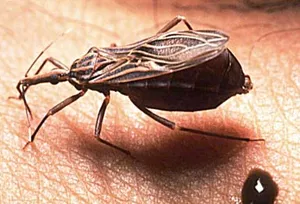
Research Excellence Award winner shares his findings on the ‘kissing bug’
It’s a chronic and potentially life-threatening disease that afflicts millions of people in Latin America—but a new way to prevent it may be possible, thanks to a discovery by a University of Toronto Mississauga biology professor who studies the insect that spreads it.
Chagas disease is caused by the parasite Trypanosoma cruzi and transmitted primarily by a blood-sucking insect called Rhodnius prolixus. Known as a “kissing bug,” it bites humans on their faces while they are sleeping, feeds on their blood and urinates on their faces. When this parasite-laden urine is absorbed the body, it leads to infection. The long-term health problems for those affected by this generally incurable disease can include an enlarged heart, digestive issues, dementia, and a greater chance of stroke and heart failure.
However, new research by Professor Ian Orchard, the head of an insect neurophysiology lab at UTM, reveals for the first time the chemical and molecular processes involved in regulating how Rhodnius urinates. Orchard says the finding may make it possible to develop pesticides that prevent the insect from harming humans. The research was published in 2011 in The Journal of Experimental Biology, and conducted in collaboration with the U.S. Department of Agriculture and with other academics and post-doctoral students at UTM and at other institutions in Ontario, the U.S., Brazil, Denmark, and the UK.
For his research, Orchard won UTM’s 2013 Research Excellence Award, which recognizes professors who have mastered their area of inquiry, and excel at communicating their research results and promoting the research abilities of students. At Friday’s Research Excellence Lecture at UTM, he shared his findings in a talk called “The Kiss of Death: Rhodnius prolixus, Chagas disease, and what has this to do with neuroscience?” Held at room 140 in the Instructional Centre, the free community talk and reception that followed attracted a crowd of about 100 people that included UTM students, faculty members and administrators.
During his 50-minute talk, Orchard discussed the modus operandi of the large, reddish-brown Rhodnius: after it bites a human face, it sucks blood for 20 minutes, eating ten times its weight in blood and swelling up like a balloon. When the parasite-carrying urine it leaves behind is rubbed by people into their eyes or the open skin caused by the bite, it causes significant swelling and symptoms such as fever, fatigue, aches, rash and vomiting that characterize the acute phase of Chagas disease. Over the long term, the disease causes problems with the heart, digestive system, nervous system, motor system, and brain, and if left untreated, it can be fatal. The World Health Organization estimates the disease affects up to eight million people—though possibly as many as 18 million—mainly those living in poor, rural areas in Mexico and Central and South America.
Through his research, Orchard and his research partners were able to determine the neurons, neurohormones and receptors that activate and stop the insect’s diuresis (urination)—knowledge that is critical to controlling the transmission of Chagas disease.
When asked during the audience Q&A about the practical applications of his research, Orchard responded that, “at the moment, conventional pesticides are not working well; the insects are becoming resistant…[this research opens doors]…to a novel form of pest control.”
